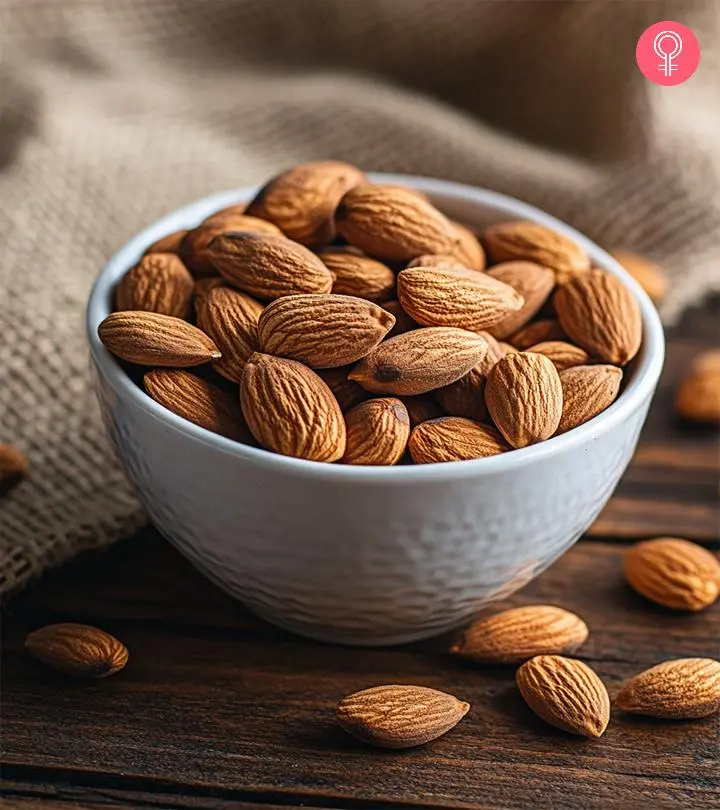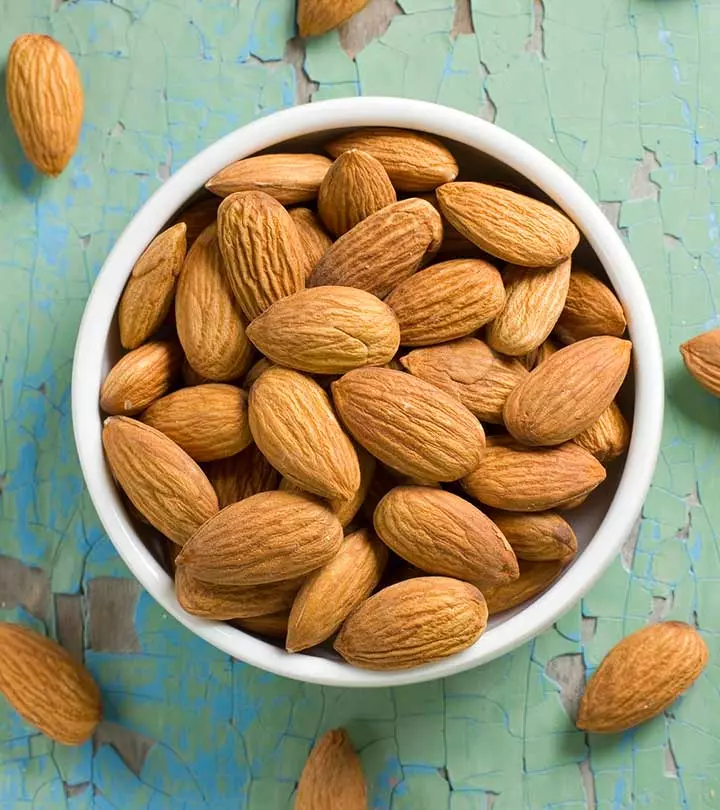11 Side Effects of Eating Too Many Almonds
Eating too much of this nutty tidbit can be more harmful than you think.

Image: Midjourney/ StyleCraze Design Team
A few side effects of almonds may make you wonder if you should consume them. Almonds are crunchy, nourishing, and delicious. They have many culinary uses and make a great snack. These nuts provide numerous health benefits and are a great source of nutrients.
However, studies found that excessive consumption of almonds can cause adverse effects. This article examines the health impacts of almond consumption and any potential drug interactions. Read on.
 Know The Flip Side: Almonds
Know The Flip Side: AlmondsShort-Term Effects
Constipation, weight gain, allergies, digestive issues like stomach ache, and diarrhea.
Long-Term Effects
May aggravate toxins in the body, cause kidney stones, or lead to a vitamin E overdose.
Drug Interactions
May interact with medication for blood pressure.
When To See A Doctor
If you develop allergic reactions such as skin rashes, or shortness of breath, seek medical help immediately.
In This Article
Types Of Almonds
Almonds come in several distinct types, each with its own unique characteristics. The two primary categories of almonds are sweet and bitter.
Sweet almond is the more common variety of the two. It is widely consumed and recognized for its mild, delightful flavor. It is a key player in the culinary world and provides a plethora of health benefits owing to its impressive nutritional profile (1).
In contrast, bitter almond contains amygdalin, a compound that can release toxic cyanide when ingested (2). Due to this inherent danger, bitter almond is not suitable for consumption and is typically used in the production of almond extracts, flavorings, or cosmetics.
Nevertheless, excessive consumption of either type can result in an array of adverse reactions. Learn more about them below.
Key Takeaways
- Eating too many almonds might cause diarrhea, bloating, and an upset stomach.
- It could be tough to digest almonds.
- Almonds’ high oxalate content has been associated with kidney stones in certain people.
- Excessive intake of vitamin E can disrupt the body’s ability to control blood clotting and cause hemorrhage.
What Are The Side Effects Of Almonds?
While almonds are extremely healthy, they may also negatively impact your health. But before we take a look at the side effects, understand that all the side effects mentioned below are intended for informational purposes only. They are not a substitute for professional medical advice. Always seek the guidance of a qualified healthcare provider with any questions you may have regarding the intake of almonds and their effect on your health.
1. May Cause Constipation

There is a common query that do almonds make you poop? The answer is not as simple as you’d like to think. Almonds are rich in fiber and potassium that can improve bowel movements. An ounce of almonds (about 23 kernels) contains 3.5 grams of fiber (3). Though this is good, the excess intake of fiber can lead to constipation and a host of other gastrointestinal issues if not combined with enough water intake (4).
Anecdotal evidence also suggests that the excess intake of almonds (and their fiber) may lead to gastrointestinal symptoms like bloating, gas, abdominal pain, and diarrhea. Moreover, studies suggest that consuming almonds in moderation may not affect gastrointestinal health (5). Thus, avoid overeating almonds.
2. Decrease Nutrient Absorption
The excess fiber can also bind with other minerals (like calcium, magnesium, zinc, and iron) and interfere with their absorption in the bloodstream causing nutrient deficiencies. A study published in the Diabetes Care journal looked at how high levels of dietary fiber, particularly soluble fiber, affect the balance of minerals like calcium and phosphorus in people with type 2 diabetes. This is what you need to know about it:
- It was conducted on 13 people who followed two different diets for 6 weeks each.
- The first diet was high in fiber, while the other had moderate fiber. The rest of the nutrients in the diet were similar.
- The results showed that the high-fiber diet led to more stool output and less calcium and phosphorus loss in urine.
- There was a slight decrease in the amount of calcium in the blood.
- However, there was no significant difference in the actual absorption of calcium or the amount of calcium, magnesium, or phosphorus in the stool.
The study concluded that while a high-fiber diet can slightly affect calcium and phosphorus levels in people with type 2 diabetes, it does not drastically change their mineral balance (6).
To offset this, consider consuming almonds as a single snack or in between meals to fully enjoy the benefits of almonds. Also, ensure you are getting enough calcium and other minerals in your diet.
The recommended daily fiber intake is about 30 grams for most people (7). Anything beyond that can cause issues.
3. May Cause Weight Gain

An ounce of almonds (23 kernels) contains about 164 calories (3). Though this is not a problem by itself, if you consume almonds in excess (more than 20), on top of following a high-calorie diet, you can pile on pounds over time.
This is especially true if you do not indulge in regular physical exercise.
It is highly unlikely almonds by themselves can cause weight gain. Consuming them in excess as well as following a poor lifestyle makes one prone to weight gain.
4. Can Lead To Allergies
After walnuts and cashews, almonds cause most tree nut allergies in the US (8).
Amandin, a protein in almonds, has been identified as an allergen (8).
Though almonds may be good for dental problems but overconsumption can cause oral allergy syndrome in certain individuals. The symptoms include itchy mouth, scratchy throat, and swelling of the tongue, mouth, and lips (9).
Almonds also can cause a much severe allergic reaction called anaphylaxis (10). This condition is characterized by shortness of breath, hives, nausea or vomiting, confusion, impaired voice, low blood pressure, headache, and dizziness.
5. May Lead To Vitamin E Overdose
Almonds are rich in vitamin E (3). But consuming them in excess may lead to vitamin E overdose.
Though overdosing on vitamin E by merely eating almonds is highly unlikely (one cannot just eat so many almonds!), it is essential we are aware of the repercussions.
If you are already consuming other foods rich in vitamin E (like fortified cereals and whole grains), excess of almonds can cause problems.
Excess intake of vitamin E can interrupt blood coagulation and lead to hemorrhage (11). However, these effects are more prominent in individuals taking excess of vitamin E supplements.
6. May Cause Kidney Stones

Almonds are rich in intestinal soluble oxalates, which are compounds that can bind to minerals in the body, like calcium, and form crystals that might cause kidney stones or even contribute to renal failure over time (11). Reports suggest that oxalates from almonds have a high bioavailability (13). This means the body can easily absorb the
Evan Levine, M.D., shared his negative experience with almonds in a personal blog, connecting his almond consumption to a kidney stone issue. He stated, “I came down with a calcium oxalate stone, and the only risk I could find was that I ate a lot of almonds. Almonds contain the most important ingredient needed to form the most common type of kidney stone — oxalate (i).”
A hundred grams of roasted almonds contains 469 milligrams of oxalate (14).
7. Increase Toxins In The Body
Almonds, especially bitter versions, can cause cyanide poisoning. They contain a chemical compound called amygdalin, which can break down into cyanide (hydrocyanic acid) when consumed. The HCN level is 40 times higher in bitter almonds as compared to sweet almonds (15).
After enzymatic hydrolysis, hydrocyanic acid (HCN) may interfere with the body’s ability to use oxygen, leading to symptoms like respiratory problems, nervous breakdown, choking, and even death (16). Hence, they are a strict dietary prohibition for pregnant and lactating women.
8. Digestive Issues
Research suggests that consuming almonds in moderation may have a small impact on increasing stool frequency in healthy people (17). This might be beneficial for those with constipation but could cause bloating or loose stools in sensitive individuals. Due to this, some people who consume almonds experience digestive issues, such as stomach aches and diarrhea. While there is no scientific study on these side effects, anecdotal evidence suggests these symptoms may occur immediately after consumption or several hours later. If you experience these symptoms, try taking probiotics or drinking plenty of water. You may also want to avoid eating nuts for a few days before trying again.
9. Heartburn
According to anecdotal evidence, almonds may cause heartburn in some people. Heartburn occurs when acid refluxes back up into the esophagus. People who experience heartburn often feel burning sensations in their chest (18). However, some studies also suggest that almonds may actually neutralize stomach acid, as they are a good source of healthy fats. So, you can consume them as a snack or add them to your meals (19).
If you still experience heartburn after almond consumption, it is best to consult a doctor. To prevent heartburn, you may also try eating smaller portions of food at once and chewing slowly. Avoid foods that cause indigestion, such as spicy foods, alcohol, caffeine, and fatty foods.
10. Bloating
Almonds are rich in fiber, and research shows that consuming too much of it may increase the risk of bloating (20). So, almonds may make you feel bloated, especially if you are already on a high-fiber diet. Bloat is caused by gas buildup in the intestines. Gas builds up in the body due to poor digestion. Eating small meals throughout the day helps keep bloating under control. Try avoiding foods that cause gas, such as beans, broccoli, cauliflower, cabbage, Brussels sprouts, onions, garlic, and dairy products.
11. Nausea

Almonds contain cyanides, and if consumed in excess, they may lead to symptoms like nausea and vomiting in humans. This is a serious issue and may also include symptoms like diarrhea, mental confusion, dizziness, fatigue, and convulsions. Consult a doctor immediately in such a case (21).
That said, sometimes nausea, which is a feeling of sickness or discomfort in the stomach, can be triggered by certain foods, medications, or changes in weather. Foods that trigger nausea include citrus fruits, tomatoes, cucumbers, peppers, chocolate, and coffee. Medications that can cause nausea include chemotherapy drugs and birth control pills (22). Changes in weather can make someone feel nauseous too (such as traveling in the hot summer in a car or plane) (23).
 Fun Fact
Fun FactAlmonds are incredibly healthy, of course. But as is the case with any food, moderation is key to avoiding the potential almond side effects.
How Many Almonds Can You Eat In A Day?

Jesse Feder, Clinical Dietitian at the Memorial Regional Hospital, says, “It is recommended to have about 20-23 almonds a day for the average adult. Having more than this is considered too much. This is because almonds are high in calories and fat. When eaten in moderation, they can provide your body with healthy fats. However, if over-consumed, they can cause weight gain and other negative health effects.”
One ounce of almonds contains 23 kernels (3). There is no scientific data on how many almonds you can eat in a day to avoid the side effects. But anecdotal evidence suggests limiting your intake to 10 to 15 almonds a day. It is always better to soak almonds overnight to make fiber more bioavailable.
 Fun Fact
Fun FactThe side effects of almonds do not mean that you should completely avoid them. You can still enjoy them as a part of your healthy diet by following some tips discussed in the next section.
Tips To Enjoy Almonds Without Experiencing Side Effects
Here are some simple ways to add almonds to your diet while avoiding potential downsides:
- If you are consuming almonds for the first time, begin with 1-2 almonds a day to see how your body, especially your gut, reacts to them.
- If you experience any adverse reactions or side effects like itching and swelling, consult a doctor immediately.
- If there are no adverse reactions, gradually increase the amount over a week or two to allow your body to adjust. However, ensure not to overeat.
- If you face stomach discomfort after consuming them, try roasted almonds. Research suggests that roasted almonds absorb less stomach juice and swell less than raw almonds, making them easier to digest (24).
- You may also try soaking almonds overnight and peeling them before consumption. Anecdotal evidence suggests this can make them easier to digest and reduce the risk of bloating. However, research does not support this claim (25).
- Try consuming almonds with other foods like oatmeal or yogurt to minimize potential digestive discomfort.
- If you are allergic to other tree nuts, consult a doctor before adding almonds to your diet.
- Even if you tolerate almonds well, limit your intake to the suggested dosage.
- Ensure the almonds you consume are fresh. Stale or rancid almonds may cause stomach upset or an unpleasant taste.
Infographic: 5 Major Side Effects Of Excessive Almond Consumption
Almonds are a great crunchy snack. However, munching on one too many may have dire consequences. While the article has listed down all of the possible side effects one may face, we have compiled some of the serious ones that warrant immediate attention.
Check out the infographic below to learn more about the adverse effects of having too many almonds at a time.
Some thing wrong with infographic shortcode. please verify shortcode syntax
Almonds are loaded with many beneficial nutrients that can promote overall health. However, one must also note the side effects of almonds. They may cause constipation, weight gain, skin irritation, and vitamin E overdose. Overconsumption may also cause kidney stones, and bitter almonds may increase toxin levels in the body. These nuts may also aggravate tree nut allergies, and their fiber may interfere with nutrient absorption. Hence, practice caution and consume almonds in moderation.
Frequently Asked Questions
Who should not eat almonds?
Jesse Feder says, “People who should not eat almonds include those who have fat malabsorption issues, those at risk for kidney stones, people who have trouble swallowing, and those looking to cut back on fat intake. Almonds contain oxalates, which can increase your risk of developing kidney stones if you are already at risk for them.”
Do almonds increase heart rate?
“Almonds will not typically increase your heart rate. The healthy fats in almonds are heart-healthy and can even help reduce your blood pressure and heart rate. However, if you begin to overconsume almonds, you may begin to gain weight, and this can put added stress on your heart leading to an increased heart rate,” says Feder.
Do almonds cause inflammation?
Feder explains, “When eaten in moderation, almonds do not cause inflammation in the body. In fact, they can help fight against inflammation due to the healthy fats contained in them, as well as the antioxidant vitamin E. This vitamin has been shown to help fight off inflammation in the body. However, if you begin to overconsume almonds, you may experience inflammation due to the high fat intake and weight gain.” In addition, if you have a nut allergy, almonds may cause inflammation, rashes, nausea, etc.
What can you substitute almonds with?
You can replace almonds in your diet with hazelnuts, cashews, and pistachios (all unsalted). But remember, moderation is key. Do not consume more than a handful of nuts a day.
Are raw almonds safe to eat?
A: Yes, you can eat raw almonds. Keep in mind to wash them first and then dry them properly before storing.
Can you eat almonds on an empty stomach?
Yes, you can eat almonds on an empty stomach. Research suggests that eating almonds in the morning, with meals, or as snacks may help control blood sugar spikes and reduce hunger without causing weight gain (26)
Can you drink the water of soaked almonds?
There is limited information on this. Hence, we recommend you not to drink the water of soaked almonds without consulting your doctor.
How do you know if almonds have gone bad?
If you open the container of almonds and sense a sour, chemical-like smell, your almonds have gone bad. These rancid almonds can taste bitter and must be thrown away.
You can try almonds that are beyond the best-buy date. Almonds can last up to a year if stored properly.
How long should almonds be soaked?
You can soak almonds overnight. With proper storage, soaked almonds can remain fresh for up to a week.
Do almonds increase bowel movements?
The fiber in almonds may increase bowel movements (27). This helps treat constipation. However, if not combined with enough water, almonds may cause gastrointestinal issues.
Do almonds cause arthritis?
No, almonds do not cause arthritis.
Are almonds good for joint pain?
Since almonds are rich in vitamin E, they may have anti-inflammatory effects that may help heal joint pain (3), (28).
Can almonds help in weight loss?
Yes, research suggests that consuming almonds in moderation, combined with a low-calorie diet, may aid weight loss (29). This may be because they are rich in protein, fiber, and healthy fats that help keep you full and reduce overall calorie intake (3) (30) (31) (32).
References
Articles on StyleCraze are backed by verified information from peer-reviewed and academic research papers, reputed organizations, research institutions, and medical associations to ensure accuracy and relevance. Read our editorial policy to learn more.
- Almonds (Prunus Dulcis Mill. D. A. Webb): A Source of Nutrients and Health-Promoting Compounds, Nutrients , US National Library of Medicine, National Institutes of Health.
https://www.ncbi.nlm.nih.gov/pmc/articles/PMC7146189/ - Potential Toxic Levels of Cyanide in Almonds (Prunus amygdalus), Apricot Kernels (Prunus armeniaca), and Almond Syrup, ISRN Toxicology , US National Library of Medicine, National Institutes of Health.
https://www.ncbi.nlm.nih.gov/pmc/articles/PMC3793392/ - Nuts, almonds, United States Department of Agriculture, National Nutrient Database.
https://fdc.nal.usda.gov/fdc-app.html#/food-details/170567/nutrients - Stopping or reducing dietary fiber intake reduces constipation and its associated symptoms, World Journal of Gastroenterology, US National Library of Medicine, National Institutes of Health.
https://www.ncbi.nlm.nih.gov/pmc/articles/PMC3435786/ - Almonds and their impact on gastrointestinal physiology, luminal microbiology and gastrointestinal function: a randomized controlled trial, US National Library of Medicine, National Institutes of Health.
https://pmc.ncbi.nlm.nih.gov/articles/PMC9194426/ - Effect of a high-fiber diet compared with a moderate-fiber diet on calcium and other mineral balances in subjects with type 2 diabetes, US National Library of Medicine, National Institutes of Health.
https://pmc.ncbi.nlm.nih.gov/articles/PMC2681046/ - Fiber,Harvard T.H. Chan School of Public Health.
https://nutritionsource.hsph.harvard.edu/carbohydrates/fiber/ - Almond Allergy: An Overview on Prevalence, Thresholds, Regulations and Allergen Detection, Nutrients, US National Library of Medicine, National Institutes of Health.
https://www.ncbi.nlm.nih.gov/pmc/articles/PMC6266711/ - Oral allergy syndrome, American College of Allergy, Asthma, & Immunology.
https://acaai.org/allergies/allergic-conditions/food/pollen-food-allergy-syndrome/ - Manifestations of Food Allergy: Evaluation and Management, American Family Physician.
https://www.aafp.org/pubs/afp/issues/1999/0115/p415.html - Vitamin E, Office of Dietary Supplements, National Institutes of Health.
https://ods.od.nih.gov/factsheets/VitaminE-HealthProfessional/#h7 - Dietary oxalate and kidney stone formation, US National Library of Medicine, National Institutes of Health.
https://pmc.ncbi.nlm.nih.gov/articles/PMC6459305/ - Renal Failure due to Excessive Intake of Almonds in the Absence of Oxalobacter formigenes, The American Journal of Medicine.
https://www.amjmed.com/article/S0002-9343(15)00682-8/pdf - Nutritional management of kidney stones, Clinical Nutrition Research.
https://citeseerx.ist.psu.edu/viewdoc/download?doi=10.1.1.892.131&rep=rep1&type=pdf - Potential Toxic Levels of Cyanide in Almonds (Prunus amygdalus), Apricot Kernels (Prunus armeniaca), and Almond Syrup, ISRN Toxicology, US National Library of Medicine, National Institutes of Health.
https://www.ncbi.nlm.nih.gov/pmc/articles/PMC3793392/pdf/ISRN.TOXICOLOGY2013-610648.pdf - Evaluation of the health risks related to the presence of cyanogenic glycosides in foods other than raw apricot kernels, US National Library of Medicine, National Institutes of Health.
https://pmc.ncbi.nlm.nih.gov/articles/PMC7009189/ - The impact of almonds and almond processing on gastrointestinal physiology, luminal microbiology, and gastrointestinal symptoms: a randomized controlled trial and mastication study, US National Library of Medicine, National Institutes of Health.
https://pmc.ncbi.nlm.nih.gov/articles/PMC9761756/ - Gastroesophageal reflux disease (GERD), US National Library of Medicine, National Institutes of Health.
https://pmc.ncbi.nlm.nih.gov/articles/PMC6140167/ - Functional food in relation to gastroesophageal reflux disease (GERD), US National Library of Medicine, National Institutes of Health.
https://pmc.ncbi.nlm.nih.gov/articles/PMC10458865/ - Effects of high-fiber diets and macronutrient substitution on bloating: Findings from the Omniheart trial, US National Library of Medicine, National Institutes of Health.
https://pmc.ncbi.nlm.nih.gov/articles/PMC7056053/ - Potential toxic levels of cyanide in almonds (Prunus amygdalus), apricot kernels (Prunus armeniaca), and almond syrup, US National Library of Medicine, National Institutes of Health.
https://pmc.ncbi.nlm.nih.gov/articles/PMC3793392/ - Treatment of chemotherapy-induced nausea in cancer patients, US National Library of Medicine, National Institutes of Health.
https://pmc.ncbi.nlm.nih.gov/articles/PMC3188425/ - Motion sickness, nausea and thermoregulation: The “toxic” hypothesis, US National Library of Medicine, National Institutes of Health.
https://pmc.ncbi.nlm.nih.gov/articles/PMC5008705/ - Digestion of raw and roasted almonds in simulated gastric environment, US National Library of Medicine, National Institutes of Health.
https://pmc.ncbi.nlm.nih.gov/articles/PMC2854608/ - The effects of ‘activating’ almonds on consumer acceptance and gastrointestinal tolerance, US National Library of Medicine, National Institutes of Health.
https://pubmed.ncbi.nlm.nih.gov/28956139/ - Appetitive, dietary and health effects of almonds consumed with meals or as snacks: a randomized, controlled trial, US National Library of Medicine, National Institutes of Health.
https://pmc.ncbi.nlm.nih.gov/articles/PMC3898316/ - Safety and Efficacy of Using Nuts to Improve Bowel Health in Hemodialysis Patients, Journal of Renal Nutrition, US National Library of Medicine, National Institutes of Health.
https://pubmed.ncbi.nlm.nih.gov/32001127/ - The anti-inflammatory role of vitamin E in prevention of osteoporosis, Advances in Pharmacological Sciences, US National Library of Medicine, National Institutes of Health.
https://pubmed.ncbi.nlm.nih.gov/22162676/ - Nuts, energy balance and body weight, MDPI, US National Library of Medicine, National Institutes of Health.
https://www.ncbi.nlm.nih.gov/pmc/articles/PMC10004756/ - Protein, weight management, and satiety, US National Library of Medicine, National Institutes of Health.
https://pubmed.ncbi.nlm.nih.gov/18469287/ - Unravelling the effects of soluble dietary fibre supplementation on energy intake and perceived satiety in healthy adults: evidence from systematic review and meta-analysis of randomised-controlled trials, MDPI, US National Library of Medicine, National Institutes of Health.
https://www.ncbi.nlm.nih.gov/pmc/articles/PMC6352252/ - Fat detection: taste, texture, and post ingestive effects, US National Library of Medicine, National Institutes of Health.
https://www.ncbi.nlm.nih.gov/books/NBK53550/
Read full bio of Reda Elmardi
- Jesse Feder, RDN/LDN, is a Clinical Dietitian at the Memorial Regional Hospital. He is also a certified by the American College of Sports Medicine as a personal trainer (ACSM-CPT) and the National Strength and Conditioning Association as a Certified Strength and Conditioning Specialist (NSCA-CSCS).
 Jesse Feder, RDN/LDN, is a Clinical Dietitian at the Memorial Regional Hospital. He is also a certified by the American College of Sports Medicine as a personal trainer (ACSM-CPT) and the National Strength and Conditioning Association as a Certified Strength and Conditioning Specialist (NSCA-CSCS).
Jesse Feder, RDN/LDN, is a Clinical Dietitian at the Memorial Regional Hospital. He is also a certified by the American College of Sports Medicine as a personal trainer (ACSM-CPT) and the National Strength and Conditioning Association as a Certified Strength and Conditioning Specialist (NSCA-CSCS).
Read full bio of Ravi Teja Tadimalla
Read full bio of Arshiya Syeda
Read full bio of Aparna Mallampalli



























Community Experiences
Join the conversation and become a part of our empowering community! Share your stories, experiences, and insights to connect with other beauty, lifestyle, and health enthusiasts.